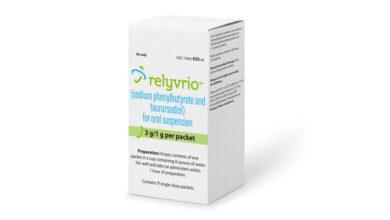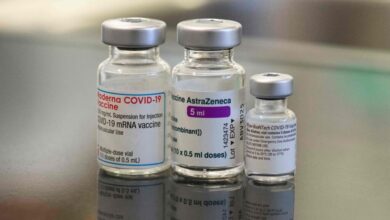Innomics, Gritstone, Otsuka, and more

Want to stay on top of the science and politics driving biotech today? Sign up to get our biotech newsletter in your inbox.
Hello! It’s Meghana. Today, we learn that Verve Therapeutics is pausing the testing of its PCSK9-focused gene editing treatment. The FDA approves the first digital therapeutic from a pharma company, and we have a new biotech scoreboard for you.
The need-to-know this morning
- Roivant announced that an autoimmune drug it acquired from Pfizer succeeded in a Phase 2 trial. The drug blocks two proteins, including TYK2, a hot target for industry in the last couple years.
- Roivant also said it would spend up to $1.5 billion on a share buyback program, a little under half of which will be devoted to buying out its now-former partner Sumitomo.
- Ipsen licensed an antibody-drug candidate for solid tumors from Sutro Biopharma for $90 million in near-term payments and just over $800 million in longer-term milestones.
Verve pausing enrollment for cholesterol gene-editing treatment
Verve Therapeutics will pause trials of Verve-101, a gene-editing treatment for familial hypercholesterolemia, after a patient receiving it had a spike in liver enzymes and a drop in platelet levels. This is a snag for the high-profile therapy, though the company will soon launch a clinical trial for a similar gene-editing medicine, VERV-102.
“I think with 101, we’ve made good progress. We now have human proof of concept, the first of its kind for in vivo base editing,” CEO Sev Kathiresan told STAT. “And I think we have two of the three major components working as designed… And with 102, we hope to be able to do that.
Verve’s base editing treatment targets PCSK9. Results in nine patients showed last year that a single treatment of VERV-101 could lower LDL levels by as much as 55%. Kathiresan said the company won’t abandon VERV-101, but after consulting with a data safety monitoring board, it will pause enrollment and focus more on VERV-102.
What we expect to see in the second quarter
Time for another biotech scoreboard! In the second quarter, we’ll see a fair amount in the obesity space. Take Zealand Pharma, which is developing a long-acting amylin analog called petrelintide. It offers the potential to spur weight loss while preserving muscle mass. A readout for a Phase 1 study is expected midyear. The company will also share Phase 2 data for its GLP-1/GLP-2 agonist called dapiglutide. We also expect obesity drug data from Structure Therapeutics, Eli Lilly, and Amgen.
But it’s not all obesity: Sage Therapeutics will have readouts in Parkinson’s disease, Huntington’s disease, and essential tremor. Aerovate Therapeutics will share results on an inhaled formulation of the cancer medicine imatinib, which has been repurposed to treat pulmonary arterial hypertension. We’re awaiting plenty of other stuff, too — from Pfizer, AbbVie, Agios Pharmaceuticals, Roivant, and others.
FDA approves Otsuka’s smartphone-based depression therapy
The FDA has approved Rejoyn, Otsuka Pharmaceutical’s smartphone-based digital treatment for major depressive disorder. It was co-developed with Click Therapeutics, and is meant to be used alongside antidepressants. The six-week program offers “cognitive-emotional training” to patients, asking them to identify and recall faces showing different emotions. The idea is to potentially “enhance cognitive control over emotional information processing.” Rejoyn will require a prescription.
Otsuka is the first drugmaker to win FDA clearance for a digital treatment for a mental health condition. But it’s still unclear whether digital therapeutics are effective, and there isn’t yet a precedent of profitability for such treatments. Otsuka has one approved drug for major depressive disorder, Rexulti, and is developing several others.
Lawmakers want to add more Chinese biotechs to defense list
Members of Congress are asking the Biden administration to add seven more Chinese biotechs to a list of companies suspected of working with Beijing’s military. The concern is that China could “create synthetic pathogens” to win an upper hand, a March 29 letter addressed to Defense Secretary Lloyd Austin said.
There’s growing concern stateside over China’s biotech sector, and legislative efforts are being considered to prevent the country from gaining access to American health and genetic data. The letter cites the companies Innomics, STOmics, Origincell, Vazyme Biotech, and others to be put on the list.
Gritstone’s preliminary phase 2 data not impressive
Gritstone bio has announced some solidly underwhelming Phase 2 data for its personalized neoantigen cancer vaccine. The study tested Gritstone’s experimental vaccine as a maintenance therapy for front-line metastatic microsatellite stable colorectal cancer, when used in addition to a fluoropyrimidine and bevacizumab, a traditional immunotherapy combination for this indication.
However, Gritstone’s vaccine didn’t demonstrate any benefit in progression-free survival — and circulating tumor DNA levels were about the same as the trial arm that only used the standard of care drugs. Gritstone tried to frame the preliminary data as positive, saying that long-term analysis will likely show clinical benefit in the third quarter.
“Pioneering new spaces carries inherent risks, and with regard to defining molecular response, we simply got it wrong,” CEO Andrew Allen said in a statement.
More reads
- ‘One-two punch’ of epigenetic cancer drugs could knock out colorectal cancer cells, FierceBiotech
- Medicare billing forms are running out of space for growing health care prices, STAT



